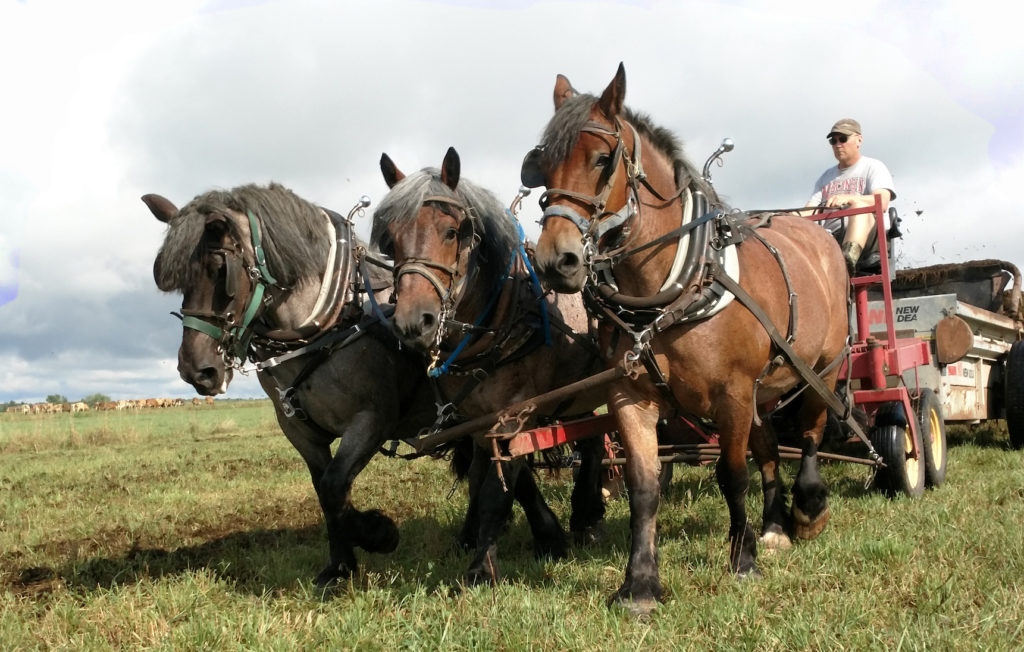Katrina and Jason Julian want to feed your family affordable, delicious, healthy dairy and beef products. Three generations, from Jason’s mom to the Julians’ three sons, work in the family business. The Julians raise certified organic, grass-fed and grass-finished Fleckvieh cattle, a breed remarkable for its suitability for both meat and milk production. The Julians’ horses are just as remarkable: their team of American Brabants (a relative of the Belgian draft horse) takes the place of tractors for much of the farmwork.
Katrina and Jason, who both grew up on farms and met in the agricultural program at UW-River Falls, began farming conventionally when they bought a dairy farm in 1996. But a desire for a lifestyle more in line with their family values led to a switch in 2007. The Julians moved to a new farm outside Medford, Wisconsin, and began the transition to organic. In 2015 they received certification. Today, their cattle graze on clover and grasses. Katrina said, “I hear from customers our meat isn’t greasy, it smells great, it has a great texture. I tell them that’s because it’s real.” No hormones or antibiotics come near the herd—“just pure goodness.”
Sustainability requires diversity
Because the dairy industry is notoriously volatile, the Julians need more income streams. Jason started Legacy Horse Logging, hiring out his team to help area landowners during the winter. Katrina also had ideas for diversification but needed help evaluating them. Enter Mark Speirs, a consultant with the SBDC at UW-Stevens Point. Thanks to the Medford Chamber of Commerce and Medford Area Development Foundation, he spends one day every two months offering free counseling to area businesses. Katrina brought her ideas to Mark, who “helped us channel our thoughts,” she said. “He’d ask questions, then send an email with links to information specific to our situation. Then we could decide what was best for our farm.”
Mark recalled, “They came in asking about value-added products—ice cream? cheese? But all their ideas involved some investment. I asked, what could they do without the investment risk?” The Julians were having success with occasional local meat sales, so decided to double down on that. But they needed help figuring out marketing channels: Katrina brought her questions to Mark, who helped the Julians gear up for retail beef marketing, from logo to license to labels.
Chance favors the prepared marketer
The Julians want to pursue both online and offline sales. With Mark’s help, they set up a Facebook page. “This sort of operation is made for social media,” Mark said. But the Julians’ big break came through an offline connection, Katrina explained: “One of our whole-animal customers is the manager of the natural foods section at County Market Grocery. She knew they were looking for a local source of grass-fed organic beef.” Now the Medford grocer carries their products. Mark observed, “Katrina and Jason are succeeding because they’ve focused on the best next business to go into. They’re very proud of their product, and take everything about it very seriously.”
Accomplishments with the SBDC at UW-Stevens Point:
- Marketing
- Decision support
- Social media training
Measured growth
Matching supply and demand is a challenge, because demand is growing more rapidly than the two to three years it takes to raise a grass-fed animal. Coordinating supply to meet that demand is not easy—getting on the schedule at one of the few busy organic butcher shops “could be a future bottleneck,” Jason observed. Meanwhile, an all-beef wiener product is in the works. In the future, Katrina plans to add chickens. A son works for a butcher, learning skills that might someday be useful as the family business grows.
